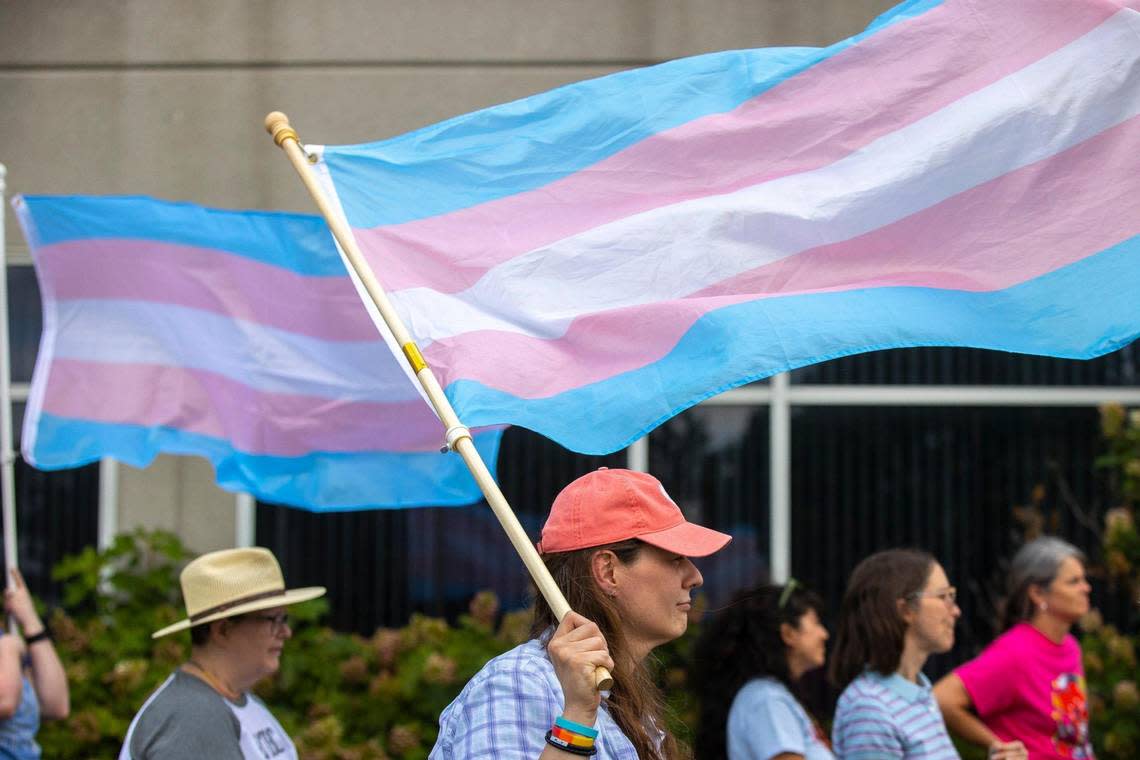Supreme Court to hear case challenging gender-affirming health care ban for transgender youth

The U.S. Supreme Court agreed Monday to review whether state laws banning access to gender-affirming health care for transgender youth are constitutional, making it the first time the nation’s highest court will weigh in on such matters.
Kentucky banned trans minors from legally accessing gender-affirming medical services last year, with the largely Republican-backed Senate Bill 150. Around the same time, Tennessee codified a similar ban. Underage plaintiffs in both cases sued and their respective requests for the bans to be temporarily blocked were granted. Republican attorneys generals in both states then appealed, bringing both cases before the Sixth Circuit Court of Appeals. A three-judge panel on that appellate court then consolidated the cases before undoing lower court decisions in both cases, once again allowing the laws to be enforced.
In November, Kentucky and Tennessee plaintiffs respectively appealed to the nation’s highest court for relief.
Separately, last April, President Joe Biden’s administration appealed the Sixth Circuit’s decision in the Tennessee case, and asked the Supreme Court to reverse it. That specific appeal is the one justices agreed on Monday to hear in their fall term, which begins in October.
Though the high court did not agree to formally review Kentucky’s case specifically, the outcome of the U.S. Department of Justice’s challenge to the Sixth Circuit’s decision “will determine how our case moves forward,” the ACLU and National Center for Lesbian Rights, who represent the Kentucky plaintiffs, said Monday.
“A favorable decision would restore care for transgender youth in Kentucky and Tennessee,” they said.
Lawsuits challenging bans in KY and TN
The ACLU sued Kentucky last May on behalf of seven unnamed trans minors and their families, in Jane Doe v. Thornbury. They argue that a portion of a 2023 Republican-backed Senate Bill 150 prohibiting Kentucky doctors from providing gender transition health care, such as puberty blockers and hormone therapy, to youth with gender dysphoria is unconstitutional.
Specifically, their lawyers say, the law infringes on trans adolescents’ Equal Protection rights because the law “expressly discriminates on the basis of sex” and their gender non-conforming status as trans people. It also violates their parents’ Due Process rights under the Fourteenth Amendment to direct medical treatment of their children, they argue.
The seven unnamed trans plaintiffs who filed with their families were, at the time, between the ages of 9 and 16. Three live in Jefferson County, one lives in the Western District of Kentucky and three live in the Eastern District.
Each plaintiff was receiving or will need gender-affirming medical care that is now illegal to access in Kentucky, care that their parents and doctors agree is “medically necessary” for their gender dysphoria, the lawsuit states.
Gender dysphoria refers to the “psychological distress that results from an incongruence between one’s sex assigned at birth and one’s gender identity,” according to the American Psychiatric Association. Gender-affirming care to treat this type of dysphoria is any care administered by a provider to reduce an individual’s “clinically significant distress by permitting them to live in alignment with their gender identity,” the lawsuit explains.
Previously in Kentucky, this type of health care was given to youth under 18 only with a parent’s or guardian’s permission. Gender-affirming care, even for youth, is considered the standard of care by major medical associations, including the American Academy of Pediatrics, the American Medical Association and the American Psychological Association.
Though Kentucky’s statute outlaws all forms of gender-affirming health care, plaintiffs are only suing to block the portion of the law that bans hormone therapy and puberty blockers, not gender transition surgery.
Last May, a federal judge in Western Kentucky granted their request for injunctive relief and temporarily blocked the medical portion of the ban hours before it was set to take effect.
“Based on the evidence submitted, the court finds that the treatments barred by SB150 are medically appropriate and necessary for some transgender children under the evidence-based standard of care accepted by all major medical organizations in the United States,” U.S. District Judge for the Western District of Kentucky David Hale wrote at the time.
But Then-Attorney General Daniel Cameron, a Republican, challenged that decision to the Sixth Circuit Court of Appeals, asking for the ban to be reinstated.
Simultaneously to the south, a similar lawsuit in Tennessee, L.W. v. Skrmetti, whose plaintiffs had also been granted temporary relief, made its way before the Sixth Circuit appellate court. A panel of appellate judges stayed that lower court’s order, reinstating the Volunteer State’s gender-affirming medical care ban.
In doing so, a three-judge panel also consolidated Kentucky’s and Tennessee’s similar cases into the same appeals process. That panel decided 2-1 in late September to reverse lower court rulings, reinstating both states’ bans.
“No one in these consolidated cases debates the existence of gender dysphoria or the distress caused by it. And no one doubts the value of providing psychological and related care to children facing it,” Chief Judge Jeffrey Sutton and Judge Amul Thapar wrote in the majority opinion.
“The question is whether certain additional treatments — puberty blockers, hormone treatments and surgeries — should be added to the mix of treatments available to those age 17 and under,” they said, adding that it was a matter for state legislatures to decide, not “life-tenured judges construing a difficult-to-amend Constitution.”
In November, plaintiffs in both Tennessee’s and Kentucky’s cases petitioned the highest court in the land and asked its justices to block both bans from being enforced.
“Our legal team is pleased that the Supreme Court has agreed to consider reversing the Sixth Circuit’s decision upholding these cruel and unconstitutional laws,” ACLU Legal Director Corey Shapiro said Monday.
“Our clients and their doctors simply want to provide the best medical care that is necessary for these amazing youth,” Shapiro said. “We remain optimistic that the Supreme Court will agree and ultimately strike down these bans.”
This is a developing story and may be updated.

